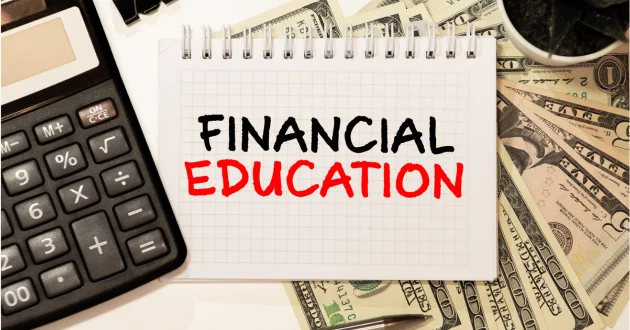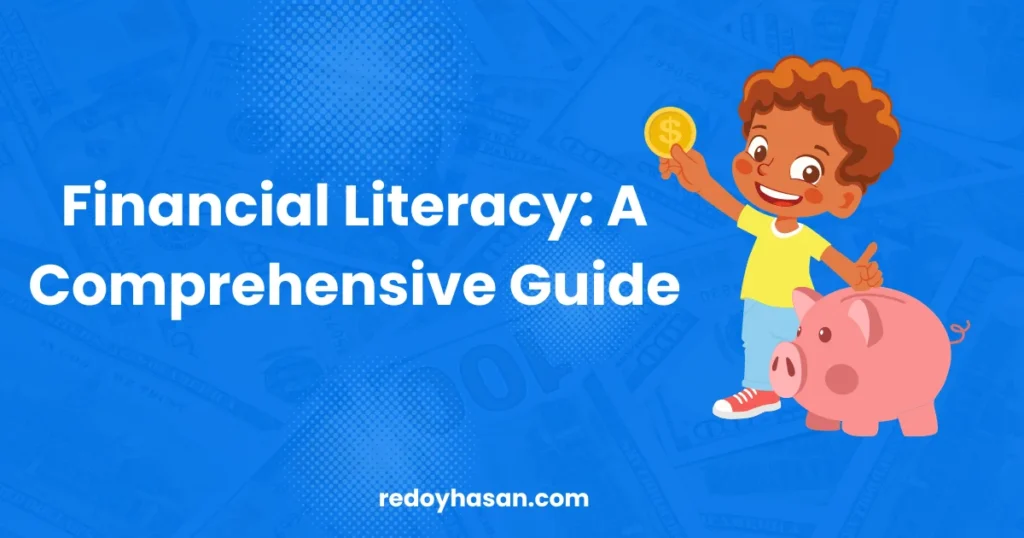
In today’s fast-paced and ever-changing world, financial literacy is an essential life skill that everyone should possess. Unfortunately, many individuals lack the necessary knowledge and understanding of personal finance, leading to poor financial decisions and a lack of financial security. This blog post aims to highlight the importance of financial education and how it can empower individuals to make informed choices, manage their money effectively, and build a strong foundation for a secure future.
What is Financial Education?
Financial education encompasses a wide range of knowledge and skills that are essential for individuals to understand and effectively manage their personal finances. It involves gaining a thorough understanding of various aspects such as budgeting, saving, investing, debt management, and comprehending financial products like loans, credit cards, and insurance. By acquiring financial education, individuals gain the necessary tools and knowledge to confidently take control of their financial future. They become equipped with the skills to create realistic budgets, effectively save for short-term and long-term goals, make informed investment decisions, manage and reduce debt, and navigate through the complexities of different financial products. This knowledge empowers individuals to make sound financial choices, avoid common financial pitfalls, and ultimately achieve financial well-being and security.
The Benefits of Financial Education
1. Improved Financial Decision Making
Financial education plays a crucial role in empowering individuals to make well-informed decisions about their finances. It provides them with the necessary tools to understand fundamental concepts like budgeting, saving, and investing. Armed with this knowledge, individuals can effectively evaluate their financial situation, set achievable goals, and make informed choices that align with their objectives. As a result, financial education can lead to improved financial outcomes, helping individuals avoid unnecessary debt and steer clear of common financial pitfalls.
2. Increased Financial Security
Financial education plays a pivotal role in equipping individuals with the knowledge and tools to secure their financial future. By understanding important concepts such as emergency funds, insurance, and retirement planning, individuals can proactively protect themselves against unforeseen circumstances and plan for long-term financial stability. The ability to establish and maintain emergency funds ensures that individuals have a safety net to rely on during unexpected events, such as job loss, medical emergencies, or natural disasters. Likewise, understanding the various types of insurance coverage available empowers individuals to protect their assets, health, and loved ones from potential risks.
3. Enhanced Money Management Skills
One of the primary benefits of financial education is the development of not just basic, but effective money management skills. Through financial education, individuals learn how to create a comprehensive budget that takes into account their income, expenses, and financial goals. They gain the knowledge and tools to track their expenses diligently, allowing them to identify areas where they can cut costs and make necessary adjustments. By prioritizing their spending, individuals can ensure that their financial resources are allocated wisely and in alignment with their priorities.
The acquisition of effective money management skills equips individuals to live within their means. They become aware of their financial limitations and make conscious decisions to avoid unnecessary debt by resisting the temptation of overspending or relying heavily on credit. Instead, they learn to make informed choices about their expenses, distinguishing between wants and needs, and making thoughtful decisions to stay within their budget.
The Role of Financial Education in Personal Growth
1. Increased Confidence
Financial education empowers individuals by equipping them with the knowledge and skills to navigate the complex world of personal finance confidently. With a solid understanding of financial concepts such as budgeting, saving, investing, and debt management, individuals can engage in conversations about money matters more effectively. They can confidently discuss their financial goals and needs, ask informed questions, and seek advice when necessary. This increased financial literacy also enables individuals to negotiate better deals, whether it’s negotiating interest rates on loans or credit cards, or negotiating for better terms and conditions on financial products and services. By making decisions that align with their values and goals, individuals can feel more in control of their financial lives and work towards achieving the outcomes they desire.
2. Improved Life Choices
Financial education is not just about learning how to manage money; it is a crucial tool for making informed decisions that can have a significant impact on our lives. With a strong foundation in financial literacy, individuals are empowered to evaluate the financial implications of major life choices. Whether it is purchasing a home, starting a business, or pursuing higher education, a solid understanding of personal finance allows individuals to assess the long-term financial consequences and make decisions that align with their goals and aspirations.
By integrating financial education into our lives, we gain the knowledge and skills needed to navigate the complex financial landscape. This knowledge goes beyond basic budgeting and saving techniques; it equips us with the ability to critically analyze financial information, understand investment strategies, and manage debt effectively. With this level of financial literacy, we can confidently make informed decisions that set us on a path towards financial stability and success.
3. Reduced Stress and Better Mental Health
Financial stress can have a profound impact on an individual’s mental health. The constant worry and anxiety that comes with money troubles can take a toll on a person’s overall well-being. However, by acquiring financial education and knowledge, individuals can better manage their finances and reduce stress related to money matters.
One key aspect of financial education is learning how to budget effectively. A budget allows individuals to track their income and expenses, giving them a clear understanding of where their money is going. By creating a realistic budget and sticking to it, individuals can ensure that they are living within their means and avoid the stress of living paycheck to paycheck.
Financial Education for Different Life Stages
1. Financial Education for Students
Integrating financial education into school curriculums is a vital step towards equipping students with the necessary tools and knowledge to navigate the complex world of personal finance. By teaching them the importance of budgeting, saving, and understanding credit, schools can empower students to develop responsible financial habits that will benefit them throughout their lives. By expanding financial literacy in schools, we can bridge the gap and help create a financially literate society.
2. Financial Education for Young Adults
As young adults transition into their independent lives, it becomes imperative to prioritize financial education. It is crucial for them to gain knowledge on various topics such as managing student loans, handling credit cards responsibly, making informed decisions about renting or buying a home, and initiating a retirement fund. Equipping young adults with these essential financial skills will enable them to navigate their early financial journey with confidence and success.
3. Financial Education for Families
Financial education for families aims to provide parents with the necessary tools and knowledge to proficiently handle household finances, while also fostering the development of sound financial habits in their children. This entails covering a range of topics, such as family budgeting, planning for future expenses like college, and imparting the importance of financial literacy to children.
4. Financial Education for Mid-Career Professionals
Experienced professionals in the middle of their careers can greatly benefit from receiving financial education that is specifically tailored to their needs. This education should cover important topics like retirement investments, optimizing employee benefits, effective tax planning strategies, and debt management techniques to enhance wealth accumulation. Equipped with this knowledge, professionals are empowered to make well-informed decisions that align with their long-term financial objectives.
5. Financial Education for Pre-Retirees and Retirees
Financial education for individuals approaching retirement and those already retired centers around essential topics such as devising strategies to generate reliable retirement income, comprehending the intricacies of social security and pension benefits, effectively managing healthcare expenses during retirement, implementing estate planning measures, and establishing a lasting legacy for future generations.
Resources for Financial Education
1. Online Courses and Webinars
There are several online platforms that offer a wide range of comprehensive courses and webinars focusing on various personal finance topics. These resources provide individuals with the convenience and flexibility to learn at their own pace while benefiting from the expertise of industry professionals.
2. Books and Publications
A wide range of books and publications are readily accessible, providing comprehensive information on diverse aspects of personal finance. These resources offer authoritative insights into topics including budgeting, investing, debt management, and retirement planning.
3. Financial Literacy Programs
Numerous non-profit organizations and government agencies proffer financial literacy programs with the primary objective of enhancing the financial well-being of individuals and communities. These programs typically encompass an array of educational initiatives such as workshops, seminars, and personalized counseling sessions, all tailored to equip individuals with comprehensive knowledge on diverse facets of personal finance.
4. Personal Finance Blogs and Podcasts
Blogs and podcasts dedicated to personal finance serve as valuable resources, offering a wealth of information and practical advice. These platforms provide comprehensive coverage on various topics and frequently feature firsthand experiences and inspiring success stories, thereby serving as both a source of motivation and education for readers and listeners alike.
5. Professional Financial Advisors
For individuals seeking personalized guidance tailored to their specific circumstances, consulting a certified financial advisor can be invaluable. These professionals have the expertise to provide comprehensive financial advice and create customized strategies to help individuals achieve their financial goals. By assessing factors such as income, expenses, savings, and risk tolerance, financial advisors can offer guidance on budgeting, investment options, retirement planning, tax strategies, and more. With their knowledge of the ever-changing financial landscape, they can help individuals navigate potential challenges and take advantage of opportunities to maximize their financial well-being. Whether it’s planning for a comfortable retirement, saving for a child’s education, or managing debt, a certified financial advisor can provide the necessary expertise and guidance to help individuals make informed decisions and progress towards their financial aspirations.
Conclusion
Financial education plays a crucial role in empowering individuals to make informed decisions about their money and secure their financial future. By acquiring the necessary knowledge and skills, individuals can develop effective money management habits, reduce financial stress, and make choices that support their long-term goals. Whether in school or at different stages of adulthood, it is never too late to invest in financial education and build a strong foundation for a secure future. Understanding concepts such as budgeting, saving, investing, and managing debt equips individuals with the tools to navigate the complexities of personal finance. By fostering a culture of financial literacy, individuals can gain confidence in their ability to handle financial challenges and take advantage of opportunities that come their way. Ultimately, financial education is an investment in oneself, leading to greater financial independence and a brighter future.


